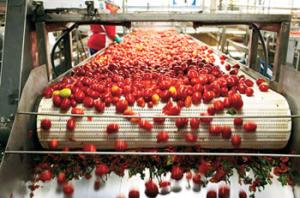- 4 reads

Kaufmann’s argument is based heavily on the work going on Frank Muller’s farm. Muller, who along with his two brothers owns 219 tracts of land in the Sacramento Valley, is an avatar of agri-technology who still relies on conventional farming methods. “If you’re not organic, it doesn’t mean you’re bad,” Muller says. While that statement may oppose the philosophy and politics of many local food movements, Muller has a point. His farm, although not listed as organic, implements numerous resource saving technologies, like burying drip tape in the middle of every row of tomato plant and creating subway seepers. In addition to produce a 35% higher crop yield, this watering system is less wasteful and largely eliminates runoff as the water goes straight to the roots instead of the plant leaves. (Last year, the Muellers sold 60,000 tons of their tomato harvest to the food giant Unilever who use the tomatoes as the main ingredient in Ragu’s Robusto style spaghetti sauce.)
Seeing as industrial agriculture is blamed for the production of approximately 30 percent of global greenhouse emissions it’s no surprise that there is an overwhelming attack on industrial agricultural processes. However, even as Americans get more food conscious with the help from documentaries and recalls, organic farms still make up less than 1 percent of the country’s cropland. If there is going to be any sort of sustainable impact on industrial practices on the other 99 percent it is going to have to come from the large-scale conventional farms like the Mueller’s.
A relatively new organization of environmentally minded stakeholders in the Industrial Agriculture business is the Stewardship Index for Specialty Crops. The Stewardship Index is composed of farmers, transnational packagers, retails, environmentalists and other stakeholders in the industrial agriculture business who seek to create a standard measurement that will help gauge the environmental impact of the seed-to-shelf life cycle of all produce-based products. Within the Stewardship Index, there are representatives from numerous organizations including: General Mills, PepsiCo, Walmart, the National Potato Council, the Natural Resources Defense Council (NRDC), the Organic Center, and numerous academics from Universities. The question that all of these organizations are working to solve is how can sustainability "permeate megafarm and megastore alike".
The Stewardship Index is currently working on ‘sustainability metrics’ that once approved and accepted will help everyone in the industry compare and contrast their sustainable methods against their peers. In addition to creating these metrics the Stewardship Index is interested in sharing information regarding water usage, soil nitrogen content, and kilowatt usage with each other and the public. Understanding the precise measurement of these items will aid in the management of resources that go into each plant. In addition, it is the hope of Stewardship Index to create a sustainability food label metric that will communicate to consumers who much energy, water, and carbon were consumed or produced in the creation of each product.
While many sustainably minded people would prefer all farms to go organic and all consumers to eat locally, it is comforting to know that mainstream Industrial Agriculture is becoming more self-aware and working towards more sustainable management of produce.
For more information on the Stewardship Index and other sustainable techniques employed on Frank Muller's farm check out the full article, What’s New for Dinner written by Frederick Kaufmann and published in OnEarth Magazine.

